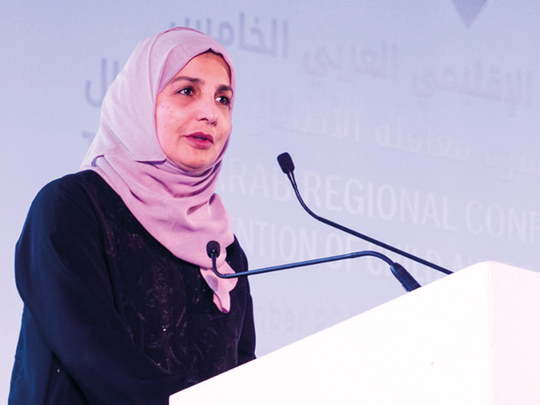
Dubai: Arab countries must give top priority to early intervention programmes to prevent abuse and neglect in the first three years of a child’s life and must also involve the private sector to end violence against children, experts recommended on Wednesday.
The recommendations were given following the 5th Arab Regional Conference on the Prevention of Child Abuse and Neglect organised by the Dubai Foundation for Women and Children (DFWAC) this week, in cooperation with the Arab Society for Prevention of Child Abuse and Neglect (Arab-SPCAN) and the International Society for Child Abuse and Neglect.
Afra Al Basti, DFWAC director-general, announced the recommendations on Wednesday and called on all Arab countries to enact more laws and enforce measures aimed at protecting children from violence in all its forms.
“Child protection must be our top priority and a core tenet of what is defined as a modern society. Effective child protection and welfare come about when all sections of society collaborate and make themselves a part of a unified process,” Al Basti said.
Al Basti also highlighted the issue of minimising the economic cost of violence through early intervention programmes.
Experts and educators should intervene by actively looking for red flags from the early days of birth to the first three years of a child, which are the most critical years in the development of an individual, Dr Majid Al Eisa, president of Arab-SPCAN, said, quoting new evidence from the World Health Organisation.
“It’s important to deliver this in the first three years of age to protect the brain of the person-to-be. We proved through studies that if we don’t intervene, there are immediate dangers: the child could die, could suffer from disabilities, mental disturbance, anxiety, depression, and [suicidal tendencies],” Dr Al Eisa said.
Aside from their mental health, an abused child has double the risk of developing hypertension, diabetes, obesity and other health problems in the long run compared to children who were not subjected to abuse.
Early intervention not only helps save the child but also government resources, he said.
“If you’re a citizen in a country or if you’re paying taxes, why would you pay this money for a rehabilitation programme, for a wheelchair, for a bed in a hospital, for an X-ray for a child who is abused by his parents ... while these could have been prevented?” Dr Al Eisa said.
“This money you’re paying can be directed to your children’s education, to streets, infrastructure for the country. So we’re wasting resources.”
Aside from the wise use of public resources, private sector support through funding is also needed in ending violence against children, Al Basti said.
“We, as NGOs, struggle and we suffer with finances. We want help from everybody, especially banks, finance sector and other private sector. We can’t proceed with a lot of our programmes because of this issue. A research, for example, will cost us $100,000 (Dh367,000) and it’s a big amount for us,” Al Basti said.
Donating to civil society groups like DFWAC is not an investment to the foundation but an investment in the life of a child, she said.
“We want them [private sector] to sponsor a study, a research, to sponsor children for their education. We want them to make a change. Maybe it’s a small amount for them, but it’s a lot for the life of the child.”
550 cases of violence
Dubai Foundation for Women and Children has received 550 cases of violence against children since 2007. Breakdown of victims:
- Emiratis: 56%
- Other nationalities: 44%
- Female: 61%
- Male: 39%
Most common types of abuse
1) Emotional abuse
2) Negligence and deprivation
3) Observing domestic abuse
4) Physical abuse
5) Sexual abuse
Conference’s recommendations
Call on all Arab countries to enact more laws and enforce measures aimed at protecting children from violence in all its forms.
Responsible institutions in the respective countries must play an active role in initiating these measures, and prepare strategies at the national level that are on a par with scientific developments and best practices recommended by international institutions in this field.
Expansion of programmes aimed at protecting children from violence on the national and regional level, in order to lower the economic cost that arises from violence.
Children and young adults must be included in the planning and execution of the aforementioned programmes.
Support urban institutions in Arab countries and empower them to carry out their due responsibilities when it comes to the prevention of abuse.
Prioritise cooperation between Arab countries in the area of data collection when it comes to cases of violence against children, and to support programme that aim at improving the capabilities of social workers in the field.
Top priority must be given to the early intervention programmes, and to involve the private sector in supporting efforts towards ending violence against children.
Implementation of laws and policies that regulate media content — both traditional and modern media.







